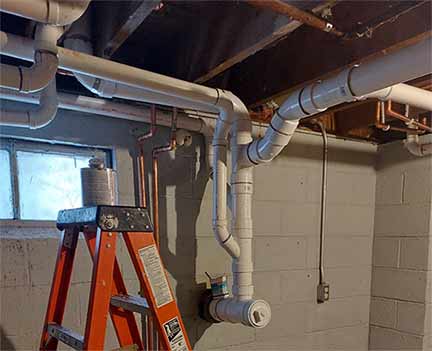
Flooding is a recurring natural disaster that poses significant risks to both individuals and communities. In recent years, the frequency and intensity of floods have been on the rise, necessitating the development of innovative flood management strategies. One such solution that has gained considerable attention is the implementation of overhead sewer systems. This article delves into the concept of overhead sewer systems and explores how they can effectively enhance flood management strategies.
Understanding Overhead Sewer Systems
Overhead sewer systems, also known as raised or high-level sewer systems, are an alternative approach to traditional gravity-fed sewer systems. Unlike conventional systems that rely on gravity to transport wastewater away from properties, overhead sewer systems utilize pumps and pressurized pipes to elevate the sewage and redirect it to higher ground or treatment facilities.
The primary distinguishing feature of overhead sewer systems is the use of backflow prevention devices, such as backwater valves. These valves prevent sewage from surging back into the property during periods of heavy rainfall or flooding. By doing so, such systems significantly reduce the likelihood of property damage due to sewage backup.
The Role of Overhead Sewer Systems in Flood Management Strategies
When it comes to flood management, overhead sewer systems offer a multitude of benefits that can revolutionize current strategies:
1. Minimize Property Damage
One of the key advantages of overhead sewer systems is their ability to minimize property damage during flooding. By preventing sewage backup, these systems greatly reduce the risk of contamination and structural damage. Property owners can rest assured that their homes and businesses are safeguarded against the destructive forces of floodwaters.
2. Protect Public Health
Flooding often leads to the mixing of contaminated floodwater with sewage, creating a severe public health hazard. Overhead sewer systems play a vital role in protecting public health by preventing the backflow of sewage into properties. By isolating the sewage system from floodwaters, the risk of waterborne diseases and the spread of pathogens is significantly reduced.
3. Reduce Cleanup Costs
The aftermath of a flood can be financially burdensome, with extensive cleanup efforts required to restore affected properties. By implementing overhead sewer systems, the cleanup process becomes more efficient and cost-effective. The absence of sewage backup prevents the additional cost and effort required for the removal and decontamination of sewage-contaminated materials.
4. Enhanced Floodwater Management
Overhead sewer systems also contribute to improved floodwater management on a larger scale. By redirecting sewage to higher ground or treatment facilities during flooding, these systems help relieve the strain on existing drainage systems. This ensures that floodwaters are more effectively managed, reducing the likelihood of widespread damage and disruption.
Implementation Challenges
While overhead sewer systems offer numerous benefits for flood management, their implementation does present certain challenges:
1. Initial Investment
Implementing overhead sewer systems can involve a significant upfront investment. The cost of upgrading existing sewer infrastructure and installing backwater valves can be a deterrent for some municipalities and property owners. However, it is important to consider the long-term cost savings and benefits provided by such systems.
2. Maintenance and Operation
Overhead sewer systems require regular maintenance and operation to ensure their continued effectiveness. Pumps, valves, and other associated equipment need to be inspected and serviced periodically. Adequate training and resources should be provided to municipal workers and property owners to ensure the proper functioning of these systems.
Conclusion
In conclusion, overhead sewer systems serve as a valuable tool in improving flood management strategies. By minimizing property damage, protecting public health, reducing cleanup costs, and enhancing floodwater management, these systems offer comprehensive solutions to the challenges posed by flooding. While implementation challenges exist, the long-term benefits make overhead sewer systems a crucial component of any flood management plan. As the frequency and intensity of floods continue to grow, it is imperative that communities explore and adopt innovative solutions like overhead sewer systems to mitigate the devastating impacts of flooding.



























